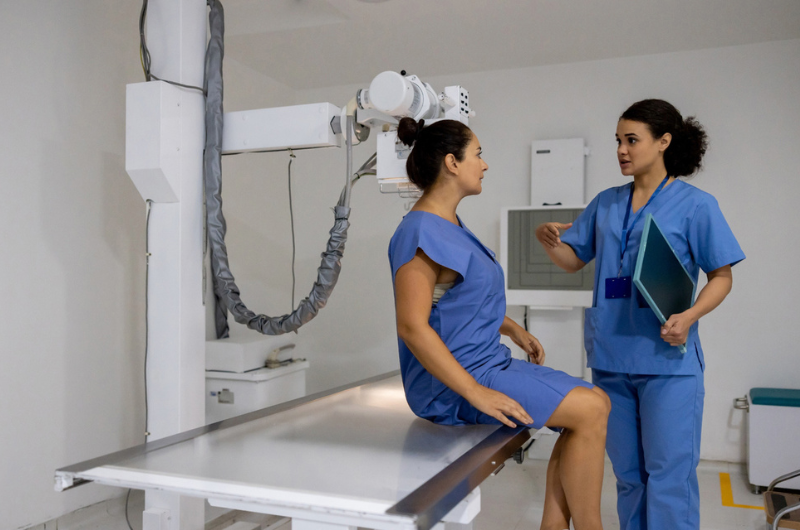What to Expect When Getting an X-ray or CT Scan at Urgent Care

May 07, 2025
You know you can go to urgent care for a cold or an earache, but did you know you can also get an X-ray?
Our expert, Michael Gerardi, M.D., an emergency medicine physician and Chief Medical Officer of Urgent Care PLUS locations, explains what you can expect when getting an X-ray at an urgent care.
Urgent Care vs Emergency Department: Where to Go
Most urgent care locations can manage many of the same conditions as an emergency department (ED), but not all of them. Dr. Gerardi says to go to the ED for severe trauma such as:
- Serious car accidents
- Falls from a height of over 15 feet
Also, if you see signs of stroke or heart attack, you should call 911 for emergency services.
“If your issue doesn’t feel urgent, you can try to make an appointment with your primary care physician,” says Dr. Gerardi. “But if you think you may have a fracture, you probably won’t be able to get an X-ray at your primary care provider’s office. In that case, urgent care would be the best place to go.”
What Is Urgent Care Like?
Like at the ED, you don’t need an appointment to go to urgent care. Wait times are usually much shorter because no ambulances come in with priority cases like at the ED.
Urgent care visits are also much cheaper than trips to the ED.
Why You May Need an X-ray or CT Scan at Urgent Care
An X-ray uses low doses of radiation to create images of your bones and internal tissues. At urgent care, X-rays are commonly used to diagnose:
- Fractures (broken bones): X-rays can pinpoint the location and severity of a fracture.
- Displaced joints: X-rays can show if joints are no longer in their proper alignment.
- Pneumonia: Chest X-rays can reveal lung infections like pneumonia.
- Arthritis: X-rays can show joint damage caused by arthritis.
- Kidney stones (sometimes): While not always visible on X-ray, some kidney stones can be detected.
- Glass or other foreign objects in wounds.
Select urgent care locations have advanced imaging equipment, including CT scanners for things like head injuries. A CT scan (computed tomography) is like a super-powered X-ray. It takes multiple X-ray images from different angles and combines them to create a detailed cross-sectional view of your body. CT scans are useful for diagnosing a wider range of conditions at urgent care, including:
- Head injuries: CT scans can detect bleeding, skull fractures and other brain injuries.
- Abdominal pain: CT scans can help identify the cause of abdominal pain, such as appendicitis or kidney stones.
- Internal bleeding: CT scans can quickly locate internal bleeding after an injury.
- Complex fractures: CT scans provide more detailed images of complex fractures than traditional X-rays.
While both X-rays and CT scans use radiation, the levels are considered safe. There are strict safety protocols to minimize your exposure.
If you are pregnant or think you may be pregnant, it’s important to share this with your doctor before getting an X-ray or CT scan.
“If you're pregnant and need an X-ray, it's okay to feel a little worried. But it's important to know that doctors only use X-rays when they really need to help you and your baby stay healthy,” says Dr. Gerardi. “The amount of radiation used in these X-rays is very small, like a tiny drop in a big bucket. Talk to your doctor – they can talk you through any concerns you have."
What It’s Like to Get an X-Ray at Urgent Care
If a doctor thinks you might have a broken bone or another injury, they may send you for an X-ray. Here’s what you can expect, step by step:
- Check-In at the Front Desk
When you walk in, you’ll check in at the front desk. They’ll ask for your name, a little bit about what’s wrong, and may ask for ID or insurance info. After that, you’ll wait for your name to be called.
- Meeting with a Nurse or Doctor
A nurse or doctor will bring you into a room to ask about your pain or injury. They might gently touch the area to see where it hurts. If they think you need an X-ray, they’ll explain why and what happens next.
You may need to remove any clothing with zippers or jewelry before going in for the scan.
- Going to the X-Ray Room
You’ll be taken to a separate room with the X-ray machine. The tech (a person trained to take X-rays) will help you get into the right position.
Depending on which part of the body is being scanned, you may be provided with a lead blanket to cover the other parts of your body.
- Staying Still for the Pictures
You may need to sit, stand or lie down, depending on what’s being looked at. The tech will ask you to stay very still for a few seconds while the picture is taken. The machine might make a quiet click or beep sound.
- Waiting for Results
After your X-rays are done, you’ll go back to your room or a waiting area. The doctor will look at the images and talk to you about what they see. They’ll let you know what’s next—whether you need a brace, a cast or just some rest.
- Checking Out and Heading Home
Once everything’s done, you’ll stop by the front desk again. They’ll help you with any paperwork or follow-up instructions.
What It’s Like to Get a CT Scan at Urgent Care
If you need a CT scan, the experience is a little different:
- You’ll lie down on a table that slowly moves through a big, donut-shaped machine.
- The scan usually takes a few minutes, and you’ll need to stay very still.
- It doesn’t hurt, and the staff will talk you through the procedure.
Not all urgent cares have a CT scanner, so if you need one, they might send you to a nearby location or hospital that does. Just like with an X-ray, the care team will explain everything and make sure you feel comfortable.
How Much Does an X-Ray or CT Scan Cost at Urgent Care?
The cost of X-rays and CT scans at urgent care can vary depending on several factors, including your location, the specific type of scan needed and the facility itself. However, urgent care is typically a more affordable option than getting these imaging services at a hospital.
- X-ray Costs: On average, an X-ray at an urgent care center can range from $50 to $250. For example, a simple X-ray of a finger or toe might be closer to the lower end of that range, while a more complex X-ray of the spine could be closer to the higher end.
- CT Scan Costs: CT scans are more sophisticated and therefore more expensive. At an urgent care facility, a CT scan can cost anywhere from $250 to $1,000 or more, depending on the body part being scanned and the complexity of the procedure.
- These prices are estimates, and actual costs may vary.
- Insurance Coverage: Most urgent care centers accept most major insurance plans. If you have insurance, your out-of-pocket expenses will depend on your specific plan's copay, deductible and coinsurance. It's always a good idea to contact your insurance provider beforehand to verify your coverage and understand your potential costs. Many urgent care centers also offer payment plans or discounts for patients without insurance or with high-deductible plans. Be sure to inquire about these options when you check in.
- Cost Transparency: Don't hesitate to ask the urgent care center about the estimated cost of your X-ray or CT scan before the procedure. They should be able to provide you with a price estimate based on your specific situation and insurance coverage. This transparency can help you avoid unexpected expenses and make informed decisions about your care.
Next Steps After Your Urgent Care Visit
Your next steps will depend on your specific condition. Here's what you can expect for some common diagnoses:
Fractures
- Your limb will be splinted or braced.
- You'll need to follow up with an orthopedic specialist within 1-3 days.
Pneumonia
- Your urgent care provider will ensure you can breathe comfortably and will prescribe antibiotics.
- Follow up with your primary care physician to monitor your improvement.
- Your doctor may recommend a repeat chest x-ray in 4-6 weeks to ensure your lungs have fully recovered.
Suspicious Mass
- You may be referred to an oncologist for further evaluation.
When to Seek Medical Help
When you feel unwell or have pain, it can be hard to tell if you have an urgent issue. It’s generally better to be cautious, especially if your symptoms don’t improve or worsen.
“If you’re worried, see a medical professional,” Dr. Gerardi says. “We are happy to see anybody who feels they need care. We can help you navigate the health care system until your problem is resolved.”
Next Steps & Resources:
- Make an appointment with an urgent care provider or call 800-822-8905.
- Hackensack Meridian Urgent Care PLUS locations offer expanded capabilities, like CT scans.
- Learn more about urgent care services at Hackensack Meridian Health.
- Find an urgent care location near you.
The material provided through HealthU is intended to be used as general information only and should not replace the advice of your physician. Always consult your physician for individual care.






